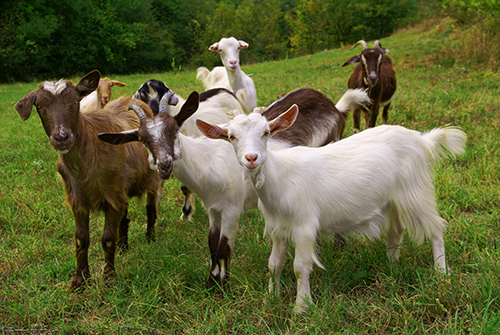Mineral Nutrition for Small Ruminants
Apr 10, 2023

Written by John Houston, director of business services for ProTrition Feed
Sheep and goats are often viewed as animals able to survive on lower-quality forages that other livestock might not use as easily. While it is true that these animals can and will utilize these lower-quality forages, we cannot ignore their overall nutritional requirements, especially if we want them to perform at their maximum potential. As with most production livestock, genetics have improved, and thus we typically see faster growth and better maternal qualities such as milk production. Research at all levels proves the impact of supplemental vitamin/mineral nutrition on health, reproduction, and growth; however, there is a lot of information with a variety of accuracy available to producers relative to mineral and vitamin supplementation. Therefore, I have attempted to make a few comments below that I hope can be of value.
It is no secret that sodium (salt) is the only mineral element that animals desire. They will seek it out wherever they are. Feed manufacturers use this reality to control the consumption of free-choice supplements to achieve the desired intake. When salt is added to a vitamin/trace mineral supplement at the farm, it will dilute the mineral and reduce consumption, resulting in less vitamin and mineral utilization by the animal.
There is a strong misconception among producers that trace mineral salt is an adequate source of vitamin and mineral supplementation. While trace mineral salt is perceived as inexpensive, it should not be considered adequate vitamin/mineral supplementation. Most trace mineral salt products are nearly 100% salt with very low levels of trace minerals and no vitamins. Therefore, trace mineral salt will not meet the daily requirements of the animal even when fed free choice.
It is important to remember that among the many differences between sheep and goats, one major difference is that sheep have a low tolerance for copper. Because of this fact, supplements intended for sheep should have no added copper. Although sheep do have a small daily copper requirement, what is provided by forage alone is typically adequate. Any additional copper above the requirement can eventually reach a lethal level, so it is standard that sheep receive no supplemental copper.
There have been some relatively recent press about copper oxide used as a dewormer. While it seems that there could be some benefit, I strongly recommend caution. Organic forms of copper and copper sulfate are much more readily absorbed than copper oxide. Feeding levels more than the animal’s requirement can put them at risk of copper toxicity (even goats).
It should be the intent of a good mineral program to meet and not exceed the animal’s requirement, which will reduce costs and waste while reducing the risk of toxicity. ProTrition Feed manufactures sheep and goat products specifically designed for this purpose. Co-op brand sheep and goat products can be found exclusively at your local Co-op.
Sheep and goats are often viewed as animals able to survive on lower-quality forages that other livestock might not use as easily. While it is true that these animals can and will utilize these lower-quality forages, we cannot ignore their overall nutritional requirements, especially if we want them to perform at their maximum potential. As with most production livestock, genetics have improved, and thus we typically see faster growth and better maternal qualities such as milk production. Research at all levels proves the impact of supplemental vitamin/mineral nutrition on health, reproduction, and growth; however, there is a lot of information with a variety of accuracy available to producers relative to mineral and vitamin supplementation. Therefore, I have attempted to make a few comments below that I hope can be of value.
It is no secret that sodium (salt) is the only mineral element that animals desire. They will seek it out wherever they are. Feed manufacturers use this reality to control the consumption of free-choice supplements to achieve the desired intake. When salt is added to a vitamin/trace mineral supplement at the farm, it will dilute the mineral and reduce consumption, resulting in less vitamin and mineral utilization by the animal.
There is a strong misconception among producers that trace mineral salt is an adequate source of vitamin and mineral supplementation. While trace mineral salt is perceived as inexpensive, it should not be considered adequate vitamin/mineral supplementation. Most trace mineral salt products are nearly 100% salt with very low levels of trace minerals and no vitamins. Therefore, trace mineral salt will not meet the daily requirements of the animal even when fed free choice.
It is important to remember that among the many differences between sheep and goats, one major difference is that sheep have a low tolerance for copper. Because of this fact, supplements intended for sheep should have no added copper. Although sheep do have a small daily copper requirement, what is provided by forage alone is typically adequate. Any additional copper above the requirement can eventually reach a lethal level, so it is standard that sheep receive no supplemental copper.
There have been some relatively recent press about copper oxide used as a dewormer. While it seems that there could be some benefit, I strongly recommend caution. Organic forms of copper and copper sulfate are much more readily absorbed than copper oxide. Feeding levels more than the animal’s requirement can put them at risk of copper toxicity (even goats).
It should be the intent of a good mineral program to meet and not exceed the animal’s requirement, which will reduce costs and waste while reducing the risk of toxicity. ProTrition Feed manufactures sheep and goat products specifically designed for this purpose. Co-op brand sheep and goat products can be found exclusively at your local Co-op.